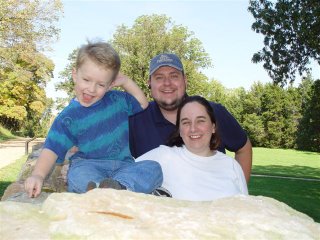 This day, Day Four of the vacation, was perhaps the most relaxing and most thought-provoking. As anticipated, my family and I spent some quality time perusing what remains of the Fredericksburg battlefield, most of which is composed of a couple of acres of still-empty battlefield space and a National Cemetery on the high ground, Marye’s Heights.
This day, Day Four of the vacation, was perhaps the most relaxing and most thought-provoking. As anticipated, my family and I spent some quality time perusing what remains of the Fredericksburg battlefield, most of which is composed of a couple of acres of still-empty battlefield space and a National Cemetery on the high ground, Marye’s Heights. It might seem strange for a man to take his wife and three-year-old son to a battlefield and cemetery, but any history ‘nuts’ out there will certainly understand. The open spaces allowed my son to burn off some excess energy by running and playing, giving him the freedom to roam while allowing us parents to watch at a safe distance.
As I said in yesterday’s entry, there are places in our country that are indeed hallowed ground. The land we visited today, while showing little or no scars of the carnage and devastation of nearly 144 years ago, there is still enough there to cause the heart to ache at the senseless loss. Thousands gave their lives for their cause, on both sides, and the soil still holds the blood of the brave brothers who faced one another with the hope that they would never have to do this again.
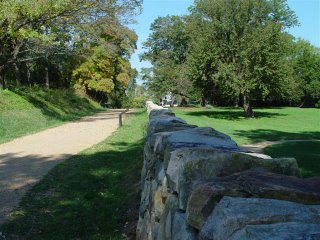 Each time I have been behind the Stone Wall, have walked the Sunken Road, my eyes fill with tears at the absurd attack by the North, and the perfectly impregnable defenses of the South. But the real emotion came on the heights above. You see, the current city of Fredericksburg grew up on the very sites of battle; quiet streets, modest homes and various businesses occupy the once empty fields of horror. The reminder of what really happened now lies behind and above the Stone Wall.
Each time I have been behind the Stone Wall, have walked the Sunken Road, my eyes fill with tears at the absurd attack by the North, and the perfectly impregnable defenses of the South. But the real emotion came on the heights above. You see, the current city of Fredericksburg grew up on the very sites of battle; quiet streets, modest homes and various businesses occupy the once empty fields of horror. The reminder of what really happened now lies behind and above the Stone Wall.Thousands of dead soldiers, mostly Union men, are now interred in the Fredericksburg National Military Cemetery, along with soldiers of other eras. Row upon row of small marble blocks dot the top of the hill and the tiered slopes of the cemetery where once brother fought brother to a bitter and bloody end. A name here, a larger monument there, but many of the 7,000 markers simply have a number.
Allow me to correct that: there is a series of numbers, and below that another number. For example, the top number may say something like “3462” on top, and just below, the number “7.” The top number indicates the grave site. The bottom number indicates the number of bodies laid to rest in that one plot, “known but to God.”
In many battles of the Civil War, soldiers would write their names on pieces of paper and pin them to their uniform, so that after the battle, their body could be identified. How many families were simply notified
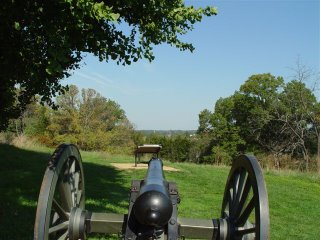 that their father, son, husband or brother gallantly and bravely died in service to their country, never to be certain where the remains of their loved one were placed. And what of those men who somehow knew they would not return to their camp after the battle, and may never be identified?
that their father, son, husband or brother gallantly and bravely died in service to their country, never to be certain where the remains of their loved one were placed. And what of those men who somehow knew they would not return to their camp after the battle, and may never be identified?As my son walked through the little headstones, I looked out on what remained of the battlefield, which Confederate artillery commander Col. Edward Porter Alexander described by saying, “A chicken couldn’t live on that field,” and looked around me at the
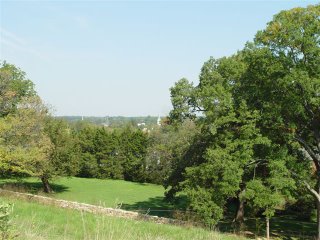 human cost, reduced to 6x6, numbered marble stones. These men truly did give their “last full measure of devotion,” as Lincoln called it, because many of them not only gave their lives, but they gave their identity, they gave their name.
human cost, reduced to 6x6, numbered marble stones. These men truly did give their “last full measure of devotion,” as Lincoln called it, because many of them not only gave their lives, but they gave their identity, they gave their name.How many of those souls had placed their trust in the Lord? How many entered Heaven’s gates at the end of a musket, the small lead ball or the blast of a cannon ushering them into eternity? How many left this world only to face a horror unlike anything they’d ever faced in battle?
Five months after the battle of Fredericksburg, another battle took place, just down the road a few miles, at a place called Chancellorsville. One of the men who lost his life at this battle was perhaps the most talented and important soldier of the war, for either side: Lieutenant General Thomas Jonathan Jackson, known to history as “Stonewall” Jackson. Accidentally shot by his own men, Jackson died of pneumonia a week later, on May 10th, 1863. He was carried from the battlefield by ambulance, a wagon pulled through the countryside on dirt paths, across plantation fields to a field hospital several miles from the front. That road passes in front of the house from where I write this very entry: Guinea Station Road.
Just a few miles down the road is the Stonewall Jackson Shrine, a small, white plantation office house where
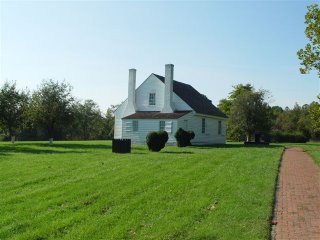 General Jackson was to recuperate after the amputation of his left arm from battle wounds. The main house, owned by the Chandler family, sat just a few yards away (this house has been gone for several decades), and it was in this home, and around the property, that thousands of men prayed for Jackson’s recovery.
General Jackson was to recuperate after the amputation of his left arm from battle wounds. The main house, owned by the Chandler family, sat just a few yards away (this house has been gone for several decades), and it was in this home, and around the property, that thousands of men prayed for Jackson’s recovery.Jackson was a devout man, one who believed that no matter what happened to him, he was in the hands of God. It was on a Sunday that as the general lay in the small room, gasping for air, in the delirium of impending death, that he spoke his final words: “Let us cross over the river, and rest under the shade of the trees.” Then, it was over. The only sound was the deafening silence, harshly punctuated by the one-second rhythm of a clock sitting on the mantle.
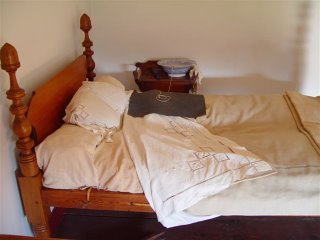 Today, I stood in the room, looking at the very bed on which Jackson died, seeing the same blankets, the chair and couch, the small table, the sun shining through the window and filling the room with light. And on that mantle was the same clock, diligently wound and ticking, reverberating like a blacksmith’s hammer on a hard, cold anvil. Although it has been 143 years and 5 months to the day since that bright spring Sunday, the weight of that day still lay heavily in the room.
Today, I stood in the room, looking at the very bed on which Jackson died, seeing the same blankets, the chair and couch, the small table, the sun shining through the window and filling the room with light. And on that mantle was the same clock, diligently wound and ticking, reverberating like a blacksmith’s hammer on a hard, cold anvil. Although it has been 143 years and 5 months to the day since that bright spring Sunday, the weight of that day still lay heavily in the room.I could almost hear the gentle footsteps as the family, doctors and staff left the small white building, the sobs of battle-hardened veterans mourning the loss of their leader, and the high wail of the Rebel yell given in salute to their fallen hero. But in this sadness still tangible these many years hence, there was also a feeling of peace and joy. I believe this feeling comes from the fact that in his last moment of earthly life, Jackson left the testimony of a true believer.
We look back with 20/20 hindsight, judging the men and the motives by modern sensibilities and social norms. We say, “The South was for slavery and for disunion, therefore they must all have been evil, Godless people.” But I believe President Lincoln said it best in his second inaugural address: “…with firmness in the right, as God gives us to see right, let us strive on to finish the work we are in; to bind up the nation’s wounds; to care for him who has borne the battle, and for his widow, and his orphan.”
Jackson, and so many others on both sides, did the best they could do with what they believed as the right cause. Most who fought for the South did not own slaves; many, like Jackson and Lee, wanted freedom for the slaves, and were fighting for one simple cause: the protection of their home. Many in the North fought to free the slaves, while others also were fighting for their home. The difference? For many in the South, their home was their state, and in the North, their home was their country, the United States of America. I believe the “Cause” of the South was wrong, but one cannot deny their bravery and valor; and ultimately, they were still Americans.
We today still fight for causes. Some of us fight for our country in the armed services; others fight ideologically by standing for the right, as God gives us to see the right. By seeking the Lord’s way in life, with Christ as our Savior and Lord, and living with a clear conscience before Him, we are not so much different from those who gave their lives upon the hallowed grounds upon which I walked today. In the end, we must do what we feel God leads us to do. Then one day, we will face our own earthly end, and if we are holding to the hand of Jesus, we, too, will cross over the river, and rest beneath the shade of the trees. What a day that will be!
And when I think of sacrifice, I cannot help but think of the ultimate sacrifice of Jesus for us. When He lay down the glory of heaven and wrapped Himself in a body of flesh like yours and mine, then went that cross for our sin, my heart breaks, while simultaneously leaping for joy. On that cross, separated from the Father because of the sins of man, because of my sin, He gave up everything for me. He gave His last full measure of devotion to us all. “Father, forgive them.” That forgiveness belongs to us all, if we accept it, and I praise God that His forgiveness is mine.
Also in his Gettysburg Address, President Lincoln gave lasting words for America and the world, and if I may be so bold (and with apologies to Mr. Lincoln), I wish to adapt that eloquent speech to fit this spiritual application and to close this entry:
Nearly one hundred score years ago, our Father brought forth into this world a new hope, conceived in faith, and dedicated to the proposition that the souls of all men might be free. Now, each day we are engaged in a great spiritual war, testing whether that salvation and truth, so conceived and so dedicated, can long endure. Our hearts are the great battlefield of that war. We pray this day to dedicate our hearts as a memorial to the One who gave His life so that we might live. It is altogether fitting and proper that we should do this. But in one sense, we cannot dedicate, consecrate, or hallow ourselves. It was that Loving and Kind Savior who lived and died for us that enables us to dedicate our lives to His purpose, far beyond our own power to add or detract from it. The world may little note nor long remember us and what we do here in our time on earth, but it can never forget what He did there on the cross of Calvary. It is for us the living, rather, to be dedicated to the unfinished work of spreading the Gospel, which He called for us to nobly advance. It is rather for us to here be dedicated to the great task remaining before us – that from His death and resurrection we take increased devotion to that cause for which He gave the last full measure of devotion – that we here and forever highly resolve that He shall not have died in vain, that this Church, founded upon His blood, shall have a new birth of courage and freedom, and that our great eternal hope, of the Lord, by the Lord, and for the Lord, shall not perish, but have everlasting life.© 2006, Chris Keeton and Soulscape Press. All rights reserved. All material printed on this site is protected by the copyright law of the United States. It may not be reproduced, distributed, transmitted, displayed, published or broadcast without the prior written permission of Chris Keeton and Soulscape Press, obtainable by writing to soulscape@alltel.net. Altering or removing any trademark, copyright or other notice from copies of the content is not permitted. Any and all portions of material copied from the Soulscape Blog must be properly attributed to Chris Keeton and Soulscape, and cited with original blog web address.




No comments:
Post a Comment